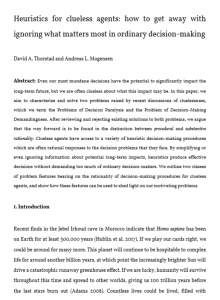Heuristics for clueless agents: how to get away with ignoring what matters most in ordinary decision-making
David Thorstad and Andreas Mogensen (Global Priorities Institute, Oxford University)
GPI Working Paper No. 2-2020
Even our most mundane decisions have the potential to significantly impact the long-term future, but we are often clueless about what this impact may be. In this paper, we aim to characterize and solve two problems raised by recent discussions of cluelessness, which we term the Problems of Decision Paralysis and the Problem of Decision-Making Demandingness. After reviewing and rejecting existing solutions to both problems, we argue that the way forward is to be found in the distinction between procedural and substantive rationality. Clueless agents have access to a variety of heuristic decision-making procedures which are often rational responses to the decision problems that they face. By simplifying or even ignoring information about potential long-term impacts, heuristics produce effective decisions without demanding too much of ordinary decision-makers. We outline two classes of problem features bearing on the rationality of decision-making procedures for clueless agents, and show how these features can be used to shed light on our motivating problems.
Other working papers
The end of economic growth? Unintended consequences of a declining population – Charles I. Jones (Stanford University)
In many models, economic growth is driven by people discovering new ideas. These models typically assume either a constant or growing population. However, in high income countries today, fertility is already below its replacement rate: women are having fewer than two children on average. It is a distinct possibility — highlighted in the recent book, Empty Planet — that global population will decline rather than stabilize in the long run. …
Meaning, medicine and merit – Andreas Mogensen (Global Priorities Institute, Oxford University)
Given the inevitability of scarcity, should public institutions ration healthcare resources so as to prioritize those who contribute more to society? Intuitively, we may feel that this would be somehow inegalitarian. I argue that the egalitarian objection to prioritizing treatment on the basis of patients’ usefulness to others is best thought…
The cross-sectional implications of the social discount rate – Maya Eden (Brandeis University)
How should policy discount future returns? The standard approach to this normative question is to ask how much society should care about future generations relative to people alive today. This paper establishes an alternative approach, based on the social desirability of redistributing from the current old to the current young. …

